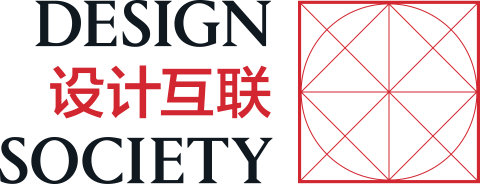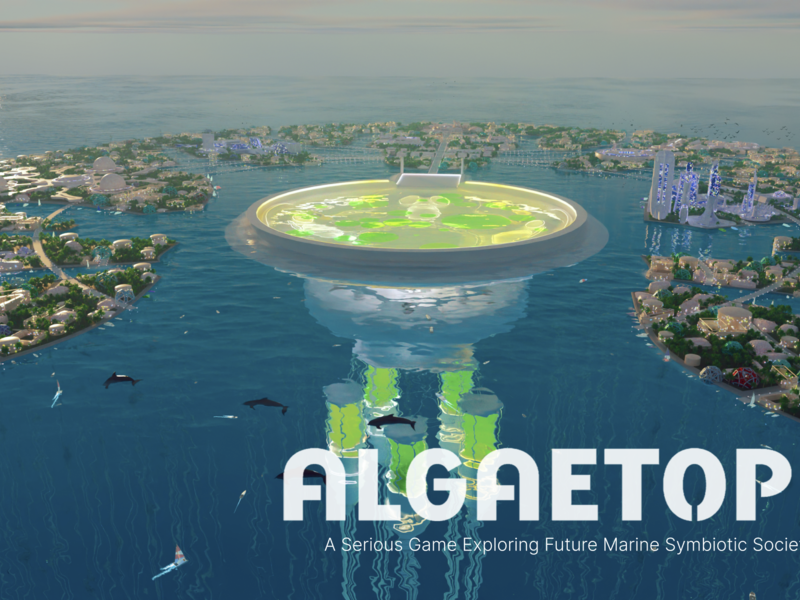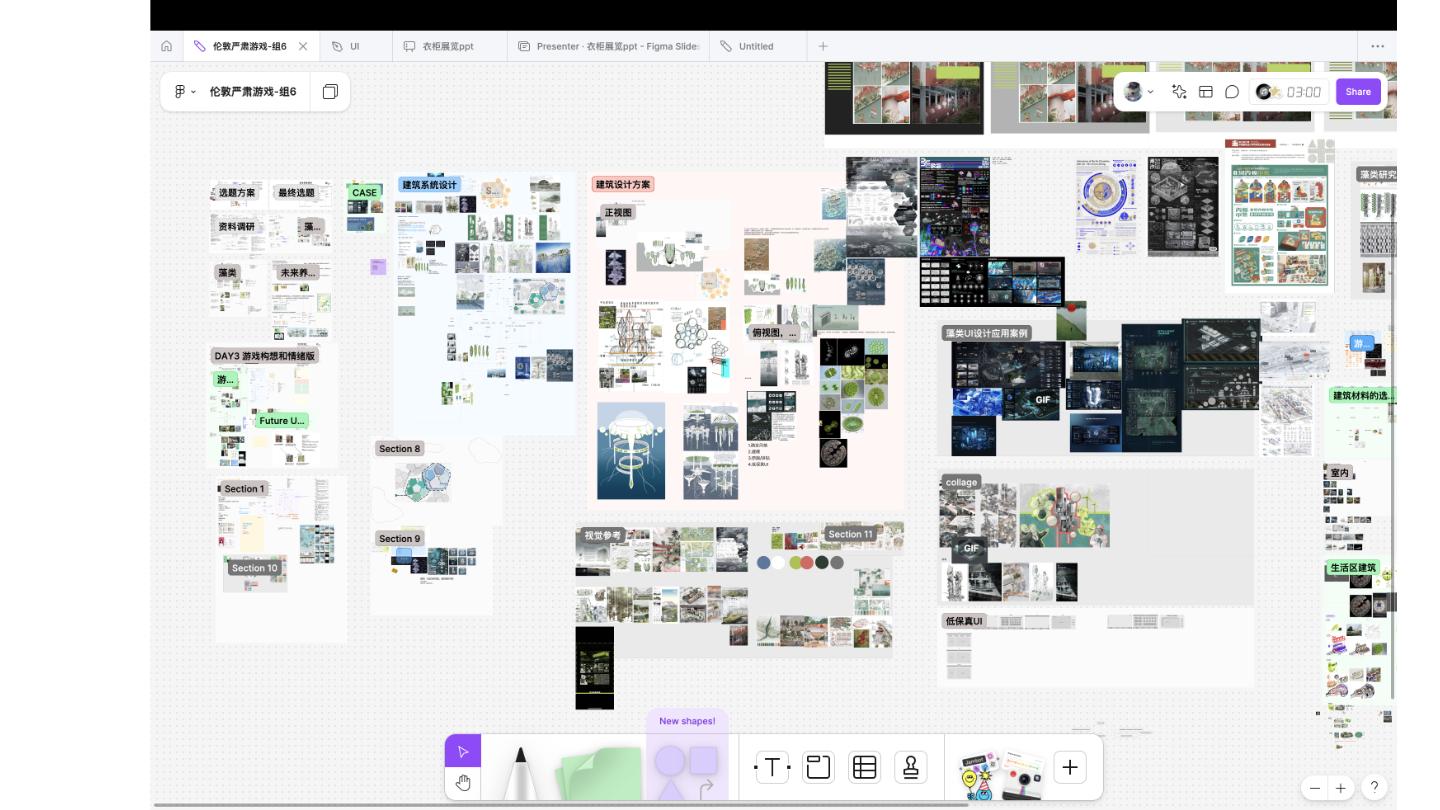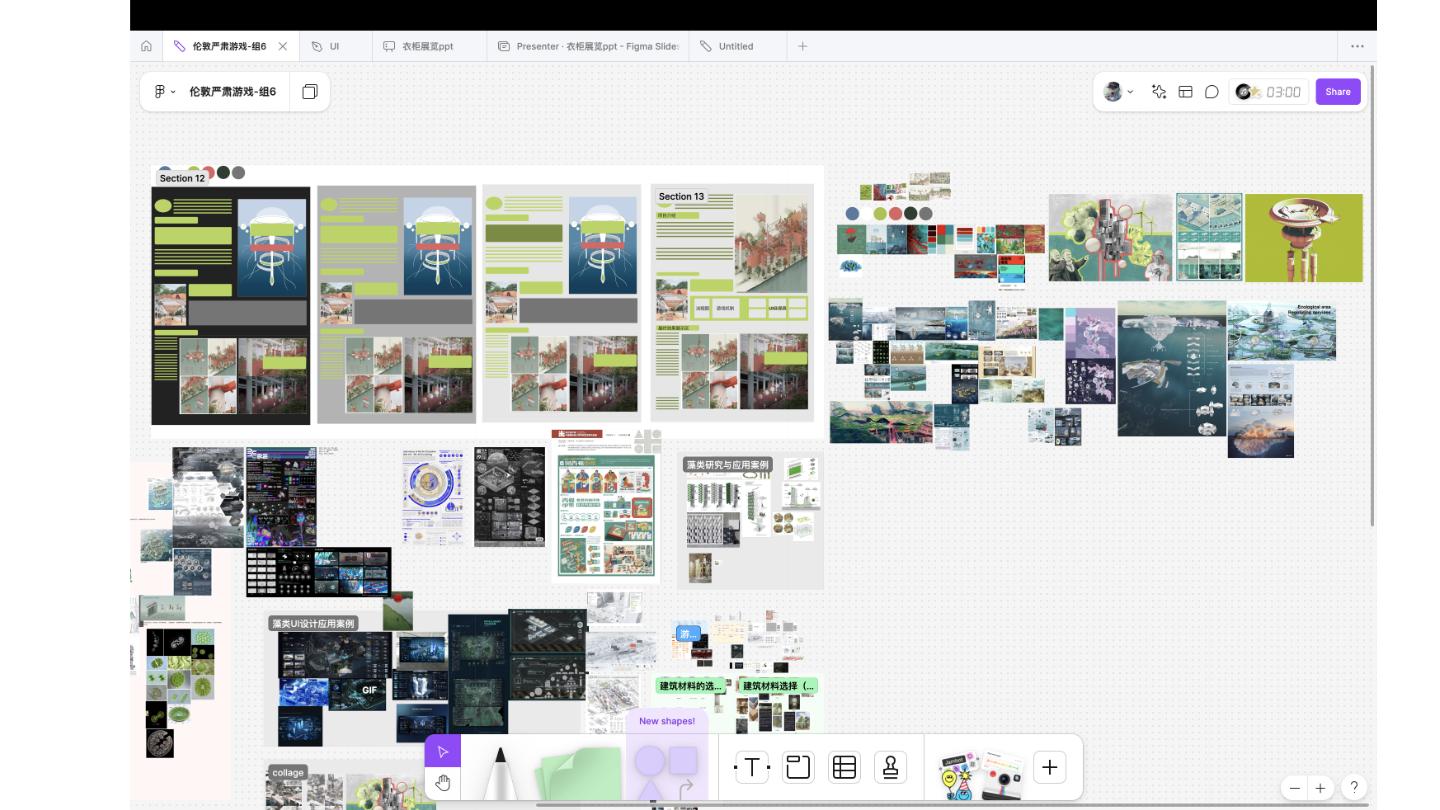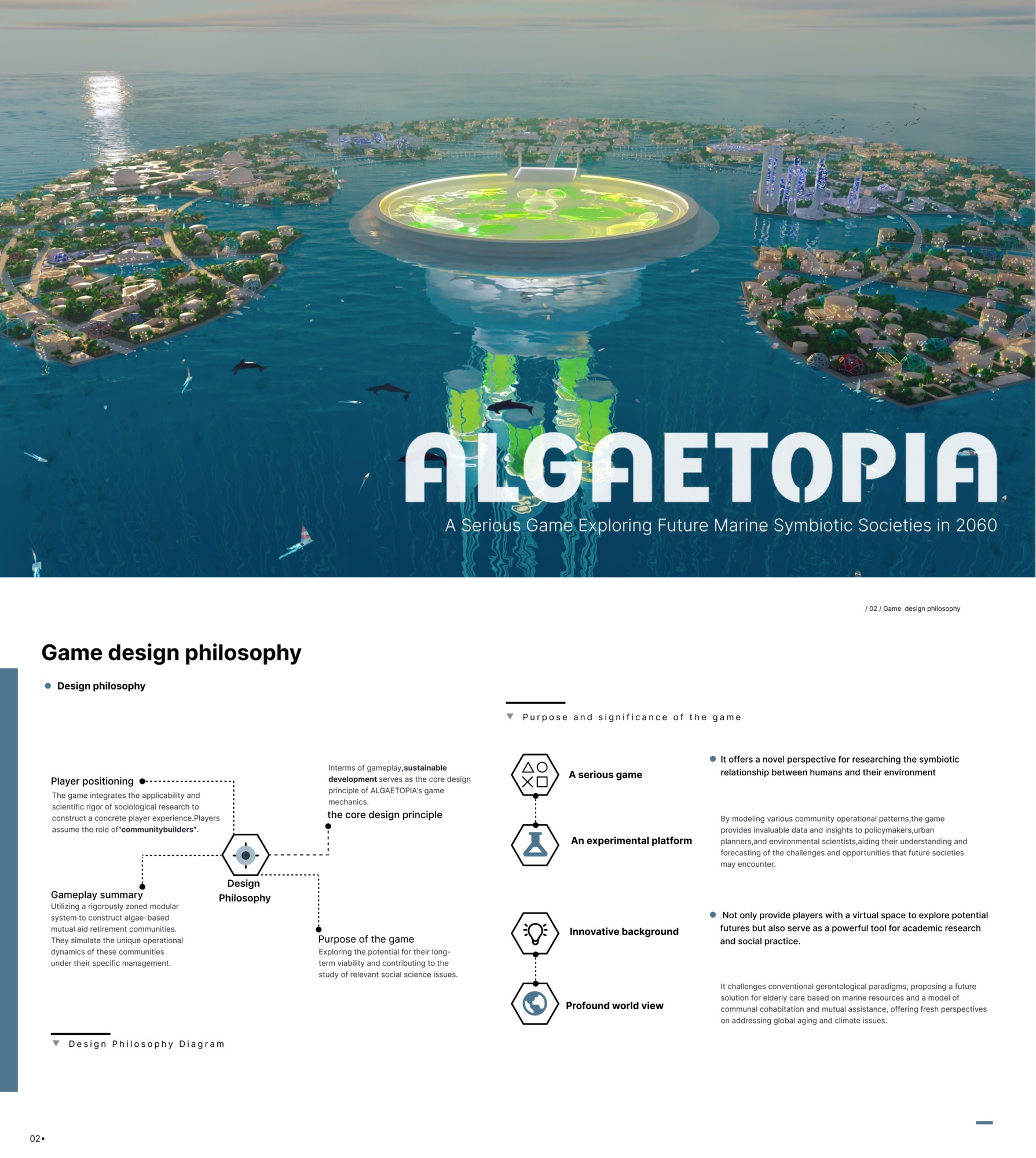
Project Introduction
ALGAETOPIA is a serious game set in the context of the future in 2060, designed to serve organizations and institutions such as the natural resources department, the civil affairs department, and the construction department. The game takes the role of algae in the future pension society as the basic concept, and explores the possibility of symbiosis between human and marine environment.
By 2060, sea level rise caused by global warming may cause most of the land to be submerged. In this context, human activities gradually shift to the ocean, giving birth to a number of maritime cities. With the depletion of non-renewable energy, humans have developed a variety of ways to use clean energy. Algae, as the most common and basic organisms in the marine environment, became the main food, energy and building materials of human beings during this period.
On the other hand, with the increase of human life expectancy, the aging of the population has increasingly become the social focus of people's attention, and the issue of providing for the aged is still the focus of human society. In the future social background, people's ideas have changed greatly. More and more people no longer take marriage and family as the main standard to demand themselves, but choose a more open, inclusive and more mobile interpersonal relationship. In this model, the elderly play a variety of roles to maintain the operation of the community, but also accept the services of other elderly, to achieve a virtuous circle of mutual assistance.
In terms of gameplay, simulation (Sustainable Development) is the core design of ALGAETOPIA game mechanics. The combination of the application and science of the game and the sociological research itself constructs the concrete player experience. As a "community builder", the player will use the basic module with strict functional zoning to build the algae mutual aid pension community, and simulate the unique operation mode of the community under the specific operation of the player, so as to explore the possibility of the long-term operation of the community and assist the research of relevant social science issues.
ALGAETOPIA is not only a game, but also an experimental platform to simulate the social operation in a specific environment in the future, which provides a new perspective for the study of the symbiotic relationship between human beings and the environment. By simulating different modes of community operation, the game can provide policy makers, urban planners and environmental scientists with valuable data and insights to help them understand and predict the challenges and opportunities that society may face in the future.
Its innovative background setting and profound world outlook metaphor not only provide players with a virtual space to explore future possibilities, but also provide a powerful tool for academic research and social practice. It challenges the traditional concept of elderly care, proposes a future elderly care solution based on marine resources and co-living and mutual assistance model, and provides a new way of thinking to deal with the global aging problem and climate problem.
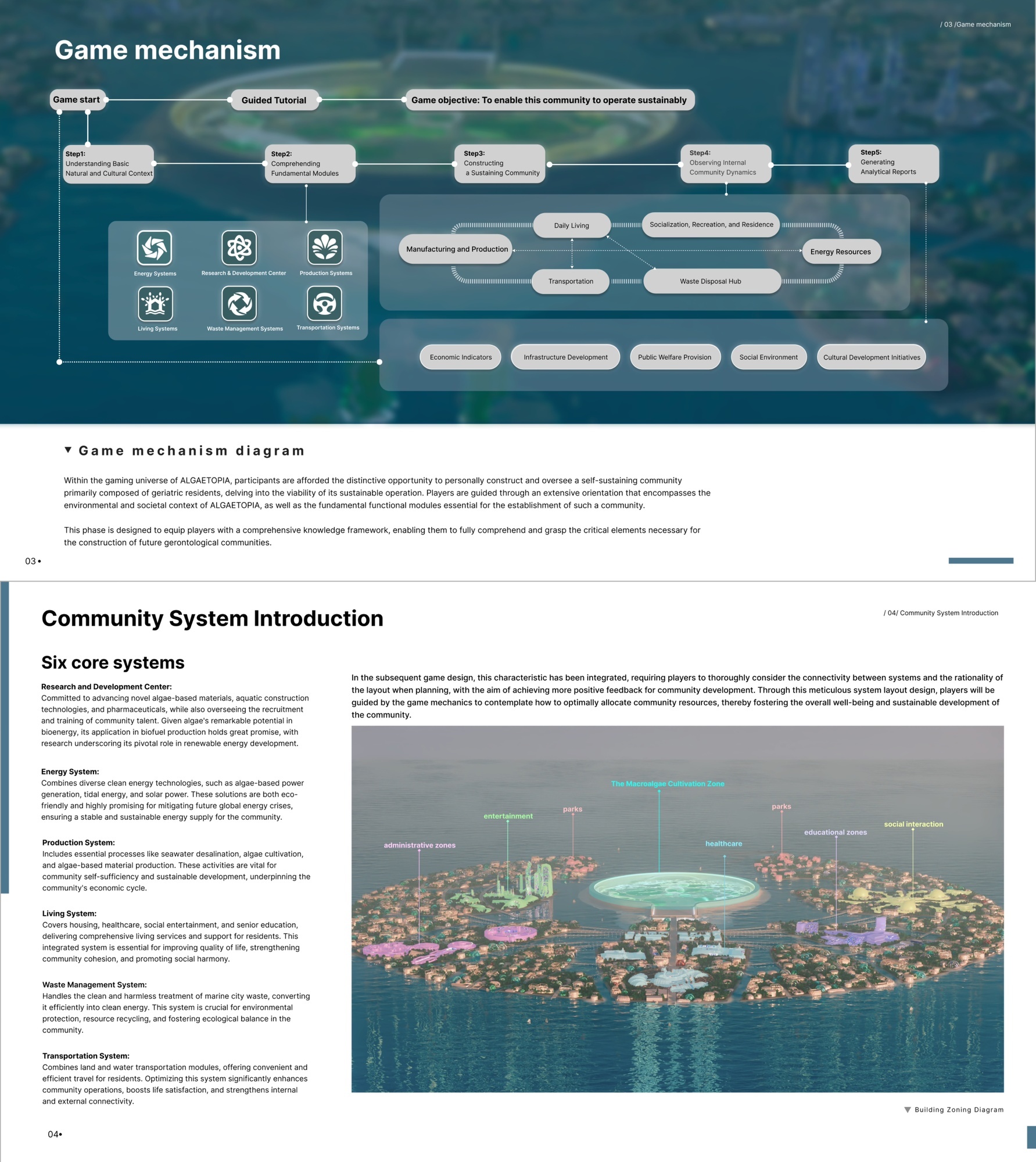
Design concept
In ALGAETOPIA game world, players will have the unique opportunity to create and manage a self-circulating community of elderly residents, and to explore the viability of its sustainable operation. Players will be guided through the detailed environmental and social context of the ALGAETOPIA, as well as the basic functional modules necessary to build such a community. It aims to provide players with the necessary knowledge framework so that they can fully understand and master the key elements of building the future retirement community.
At the completion of each construction cycle, the game system will automatically generate a detailed community status report, which covers the five key areas of material prosperity, infrastructure, livelihood security, social atmosphere and cultural construction through data visualization.
Taking people's livelihood security and economic index as an example, the report first presents data closely related to people's livelihood, including comprehensive information such as community demographics, medical resource allocation, human resource management and residents' income level.
These data provide an important basis for assessing the quality of life and social welfare of the community. Secondly, the economic index part shows the comprehensive situation of the community in terms of economic development, labor force participation and industrial structure, which is crucial to understand the economic health and development potential of the community.
Whether community building has successfully started a new cycle, or failed to reach its goal, players can get valuable feedback through these professional and detailed data reports. These reports provide players with deep insight into past construction activities while
It also provides a scientific basis for future planning and decision-making to ensure that communities can achieve sustainability and maximize the well-being of residents.
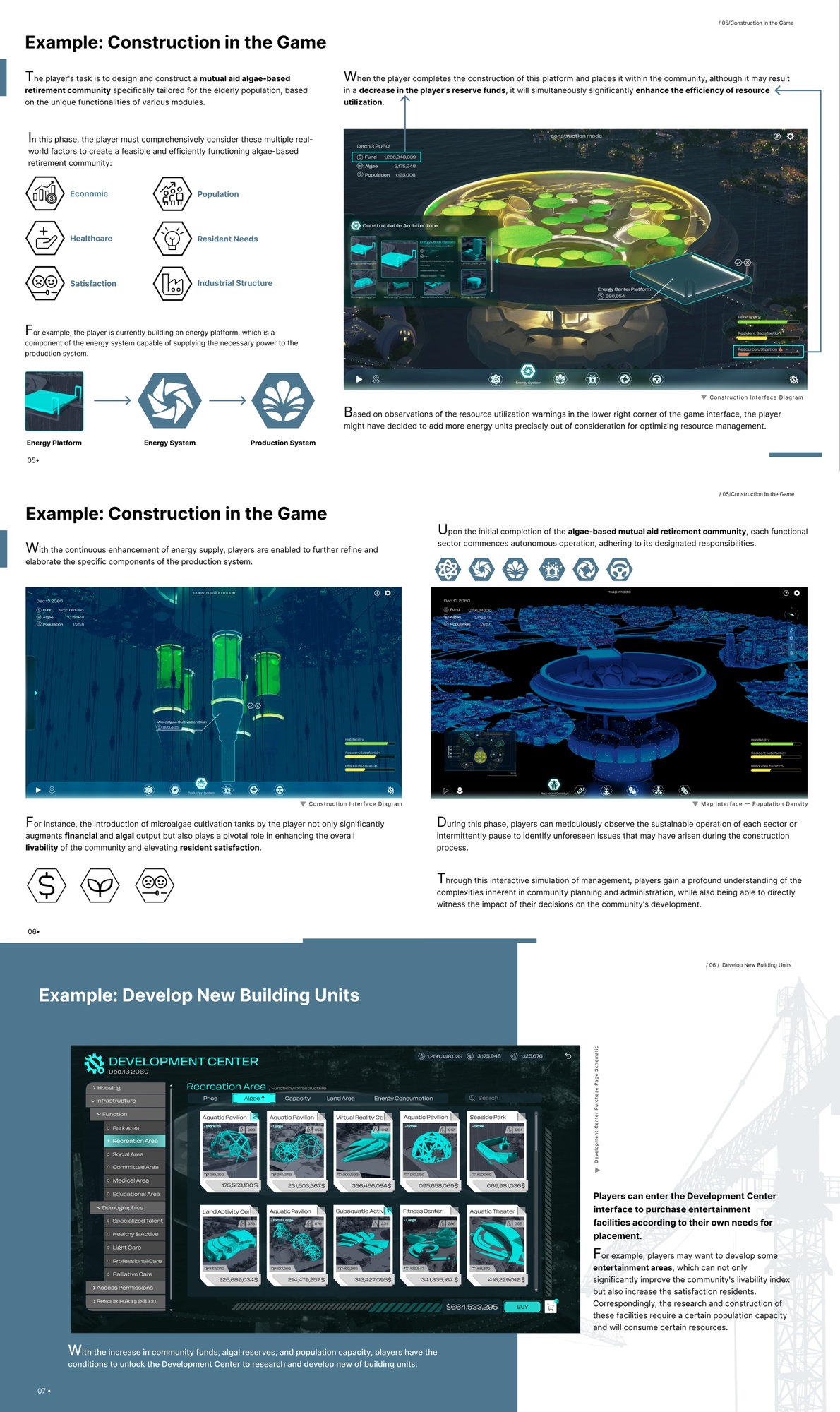
Gameplay and Interaction
From the perspective of community functionality, the ideal community in the game is carefully divided into six core systems, each of which undertakes indispensable key functions to jointly build an efficient and sustainable future community model.
First of all, the research center (Research Center) is committed to the research and development of new algae materials, water construction technology and medical drugs, and shoulder the important task of introducing and cultivating community talents. In view of the outstanding potential of algae in the field of bioenergy, its application prospect in biofuel production has attracted much attention, and relevant research has confirmed its important position in the development of renewable energy.
Secondly, the energy system (Energy System) integrates a variety of clean energy technologies such as algae power generation, tidal power generation and solar power generation. These technologies are not only environmentally friendly, but also show great potential to deal with the future global energy crisis and provide communities with a stable and clean energy supply.
Third, the production system (Production System) covers key links such as seawater desalination, algae cultivation and algae building materials manufacturing. These productive activities play a decisive role in ensuring the self-sufficiency of the community and promoting sustainable development, and are the basis of the community economic cycle.
Fourth, the Living System (Living System) includes multiple dimensions such as housing, medical care, social entertainment, and education for the elderly, and aims to provide comprehensive life services and support for community residents. A comprehensive life service system plays an important role in improving the quality of life of residents, enhancing community cohesion and promoting social harmony.
Fifth, the Waste Management System is responsible for the harmless and clean treatment of the waste generated by the sea city, and realizes the efficient conversion of waste to clean energy. The establishment of the system is of great significance for environmental protection, resource recycling and promoting the ecological balance of the community.
Finally, the transportation system (Transportation System) integrates the two functional modules of land transportation and water transportation, providing a convenient and efficient way for community residents to travel. The optimization of the transportation system has a direct and far-reaching impact on speeding up the community operation cycle, improving the life satisfaction of residents and promoting the connection between the community and the outside world.
These six systems cooperate and support each other, providing players with a future community model with complete functions, efficient operation and easy to use. As players complete a series of game behaviors, such as upgrades, purchases, and builds, a relatively mature future community has gradually formed.
At this time, players can enjoy their own construction results through the map interface, or switch to the functional map module of the map mode to test the key information such as the thermal distribution or congestion coefficient of the current community. The map mode provides professional and detailed functional map options, including population density, congestion factor, resident satisfaction, air quality, heat map and energy usage, as shown in the figure.
In the figure, the player has activated the population density function graph, which allows the player to visually assess the rationality of community building. Through this visualization tool, players can identify areas of uneven population distribution, optimize community planning, and ensure the rational distribution of resources and the quality of life of residents. In addition, these functional maps can also help players predict and solve potential urban problems, such as traffic congestion and environmental pollution, so as to promote the development of a more efficient and livable community.
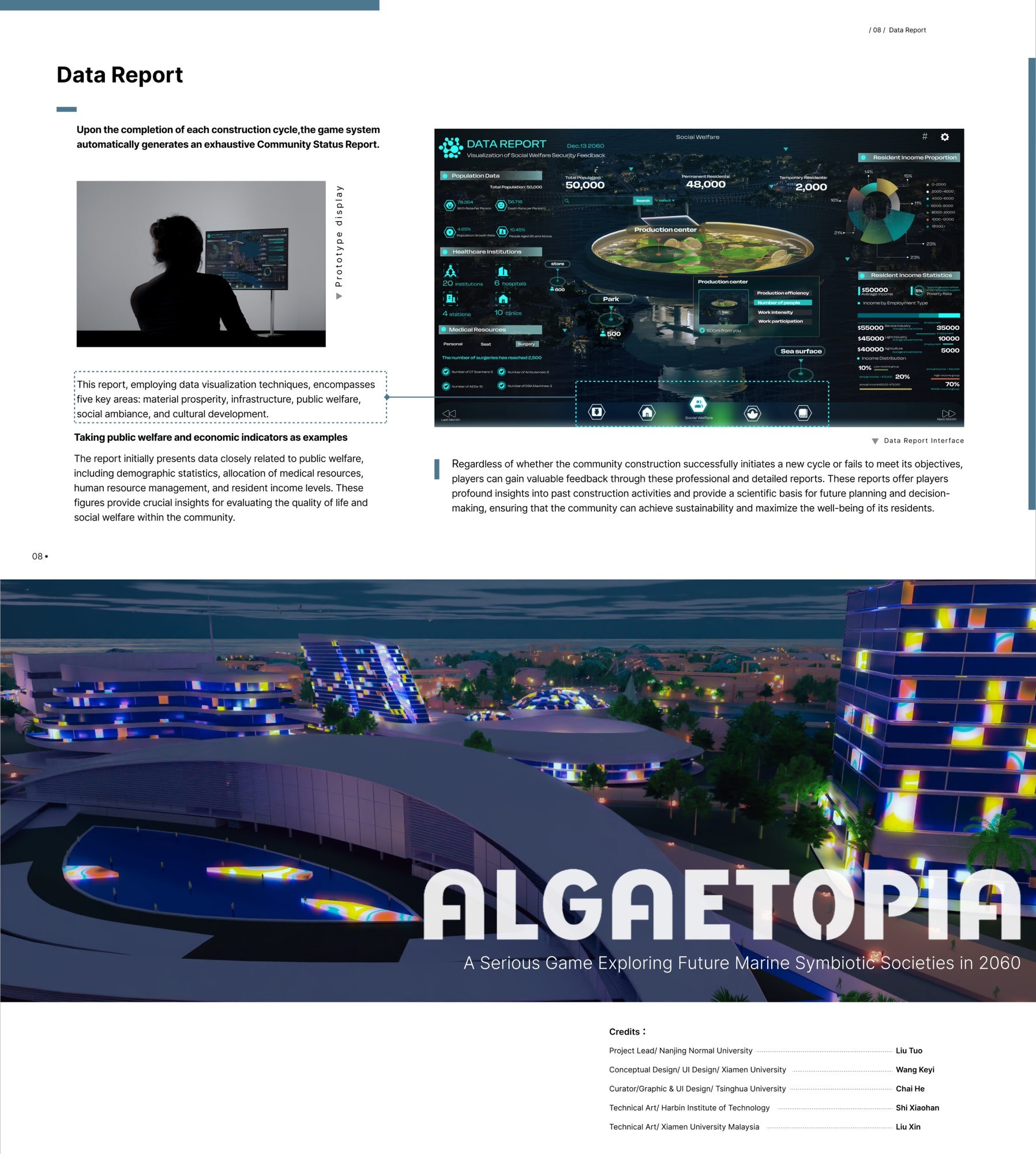
Final Report
At the completion of each build cycle, the game system automatically generates a detailed community status report. Using data visualization techniques, the report covers five key areas: material prosperity, infrastructure, public welfare, social climate and cultural development.
Taking public welfare and economic indicators as an example, the report first presents data closely related to public welfare, including demographics, medical resource allocation, human resource management, and residents' income levels. These data provide a key reference for assessing the quality of life and social welfare of the community. Subsequently, the economic indicators section shows the overall situation of the community in terms of economic development, labor force participation rate and industrial structure. This information is essential for understanding the economic health and future development potential of the community.
Regardless of whether community building has successfully entered a new cycle, or failed due to missed goals, players can get valuable feedback through this professional and detailed report. These reports not only help players gain a deeper understanding of past construction activities, but also provide a scientific basis for future planning and decision-making, ensuring that communities can achieve sustainable development and maximize the well-being of residents.
algal topan working process pptx
In the process of work, we use figma for remote communication and sharing, which shows part of our creative process
ALGAETOPIA is a serious game set in the context of the future in 2060, designed to serve organizations and institutions such as the natural resources department, the civil affairs department, and the construction department. The game takes the role of algae in the future pension society as the basic concept, and explores the possibility of symbiosis between human and marine environment.
By 2060, sea level rise caused by global warming may cause most of the land to be submerged. In this context, human activities gradually shift to the ocean, giving birth to a number of maritime cities. With the depletion of non-renewable energy, humans have developed a variety of ways to use clean energy. Algae, as the most common and basic organisms in the marine environment, became the main food, energy and building materials of human beings during this period.
On the other hand, with the increase of human life expectancy, the aging of the population has increasingly become the social focus of people's attention, and the issue of providing for the aged is still the focus of human society. In the future social background, people's ideas have changed greatly. More and more people no longer take marriage and family as the main standard to demand themselves, but choose a more open, inclusive and more mobile interpersonal relationship. In this model, the elderly play a variety of roles to maintain the operation of the community, but also accept the services of other elderly, to achieve a virtuous circle of mutual assistance.
In terms of gameplay, simulation (Sustainable Development) is the core design of ALGAETOPIA game mechanics. The combination of the application and science of the game and the sociological research itself constructs the concrete player experience. As a "community builder", the player will use the basic module with strict functional zoning to build the algae mutual aid pension community, and simulate the unique operation mode of the community under the specific operation of the player, so as to explore the possibility of the long-term operation of the community and assist the research of relevant social science issues.
ALGAETOPIA is not only a game, but also an experimental platform to simulate the social operation in a specific environment in the future, which provides a new perspective for the study of the symbiotic relationship between human beings and the environment. By simulating different modes of community operation, the game can provide policy makers, urban planners and environmental scientists with valuable data and insights to help them understand and predict the challenges and opportunities that society may face in the future.
Its innovative background setting and profound world outlook metaphor not only provide players with a virtual space to explore future possibilities, but also provide a powerful tool for academic research and social practice. It challenges the traditional concept of elderly care, proposes a future elderly care solution based on marine resources and co-living and mutual assistance model, and provides a new way of thinking to deal with the global aging problem and climate problem.
Our team is composed of undergraduates and graduate students from Tsinghua University, Nanjing University, Xiamen University, and Halbing University of Technology to explore the new form of the future algae pension model in the Pearl River Delta region in 2060.
